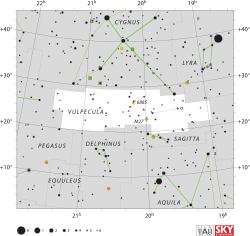23 Vulpeculae
| 23 Vulpeculae | |
 | |
| Observationsdata Epok: J2000.0 | |
|---|---|
| Stjärnbild | Räven |
| Rektascension | 20t 15m 46,13481s[1] |
| Deklination | +27° 48′ 51,2787″[1] |
| Skenbar magnitud () | +4,52 (V)[2], +4,52[3] |
| Stjärntyp | |
| Spektraltyp | K3- III Fe-1[4] |
| U–B | 1,11[2] |
| B–V | 1,258 ± 0,001[5] |
| Astrometri | |
| Radialhastighet () | 1,47[6] km/s |
| Egenrörelse (µ) | RA: -34,27[1] mas/år Dek.: 6,41[1] mas/år |
| Parallax () | 9,63 ± 0,46[1] |
| Avstånd | 340 ± 20 lå (104 ± 5 pc) |
| Absolut magnitud () | -0,58[7] |
| Detaljer | |
| Massa | 2,4[8] M☉ |
| Radie | 20,94[9] R☉ |
| Luminositet | 146[7] L☉ |
| Temperatur | 4 429[10] K |
| Metallicitet | +0,03 (Fe/H)[7] dex |
| Vinkelhastighet | 3,[11] km/s |
| Andra beteckningar | |
| 2MASS J20154613+2748512[12], HD 192806[12], HIP 99874[12], HR 7744[12], IRAS 20136+2739[12], SAO 88428[12], GSC 02163-01794[12], AG+27 2156[12], BD+27 3666[12], CCDM J20158+2749ABC[12], GC 28152[12], GCRV 12634[12], HIC 99874[12], IRC +30424[12], JP11 3203[12], PLX 4819[12], PLX 4819.00[12], PPM 110765[12], RAFGL 5488S[12], ROT 2946[12], TD1 26392[12], TYC 2163-1794-1[12], UBV 17540[12], UBV M 24674[12], WDS J20158+2749AB[12], YZ 27 11062[12], PMSC 20116+2730[12], WEB 17963[12], Gaia DR2 1836958616310522496[12] och 23 Vul[3][13] | |
23 Vulpeculae, som är stjärnans Flamsteed-beteckning, är en trippelstjärna[14] belägen i den norra delen av stjärnbilden Räven. Den har en kombinerad skenbar magnitud på ca 4,52[2] och är svagt synlig för blotta ögat där ljusföroreningar ej förekommer. Baserat på parallaxmätning inom Hipparcosuppdraget på ca 9,6[1] mas, beräknas den befinna sig på ett avstånd på ca 340 ljusår (ca 104 parsek) från solen. Den rör sig bort från solen med en heliocentrisk radialhastighet av ca 1,5 km/s.[6]
Egenskaper
Primärstjärnan 23 Vulpeculae Aa är en orange till röd jättestjärna av spektralklass K3- III Fe-1,[4] där suffixet anger ett överskott av järn i spektrumet. Den har en massa som är ca 2,4[8] solmassor, en radie som är ca 21[9] solradier och utsänder ca 146[7] gånger mera energi än solen från dess fotosfär vid en effektiv temperatur på ca 4 400 K.[10]
Huvudstjärnan 23 Vulpeculae A är en dubbelstjärna med en omloppsperiod av 25,33 år, en excentricitet på 0,40 och en halv storaxel av 0,11 bågsekunder.[15] Dess följeslagare, 23 Vulpeculae Ab, är av magnitud 6,5.[15] Tertiärstjärnan, 23 Vulpeculae B, är separerad med 0,26 bågsekunder och har en magnitud av 6,94.[8][16][14]
Referenser
- Den här artikeln är helt eller delvis baserad på material från engelskspråkiga Wikipedia, 23 Vulpeculae, 17 september 2020.
Noter
- ^ [a b c d e f] Van Leeuwen, F. (2007). "Validation of the new Hipparcos reduction". Astronomy and Astrophysics. 474 (2): 653–664. arXiv:0708.1752. Bibcode:2007A&A...474..653V. doi:10.1051/0004-6361:20078357. Vizier catalog entry
- ^ [a b c] Ducati, J. R. (2002). "VizieR Online Data Catalog: Catalogue of Stellar Photometry in Johnson's 11-color system". CDS/ADC Collection of Electronic Catalogues. 2237. Bibcode:2002yCat.2237....0D.
- ^ [a b] ”Basic data: V* 23 Vul – Double or multiple star” (på engelska). Centre de Données astronomiques de Strasbourg. http://simbad.u-strasbg.fr/simbad/sim-basic?Ident=23+Vul&submit=SIMBAD+search. Läst 7 juli 2019.
- ^ [a b] Keenan, Philip C.; McNeil, Raymond C. (1989). "The Perkins Catalog of Revised MK Types for the Cooler Stars". The Astrophysical Journal Supplement Series. 71: 245. Bibcode:1989ApJS...71..245K. doi:10.1086/191373.
- ^ van Leeuwen (2007). ”Hipparcos, the New Reduction” (på engelska). http://vizier.u-strasbg.fr/viz-bin/VizieR-5?-out.add=.&-source=I/311/hip2&HIP=99874. Läst 7 juli 2019.
- ^ [a b] Famaey, B.; Jorissen, A.; Luri, X.; Mayor, M.; Udry, S.; Dejonghe, H.; Turon, C. (2005). "Local kinematics of K and M giants from CORAVEL/Hipparcos/Tycho-2 data". Astronomy & Astrophysics. 430: 165. arXiv:astro-ph/0409579. Bibcode:2005A&A...430..165F. doi:10.1051/0004-6361:20041272.
- ^ [a b c d] Anderson, E.; Francis, Ch. (2012). "XHIP: An extended hipparcos compilation". Astronomy Letters. 38 (5): 331. arXiv:1108.4971. Bibcode:2012AstL...38..331A. doi:10.1134/S1063773712050015. Vizier catalog entry
- ^ [a b c] Malkov, O. Yu.; Tamazian, V. S.; Docobo, J. A.; Chulkov, D. A. (2012). "Dynamical masses of a selected sample of orbital binaries". Astronomy & Astrophysics. 546: A69. Bibcode:2012A&A...546A..69M. doi:10.1051/0004-6361/201219774. Vizier catalog entry
- ^ [a b] ”23 Vulpeculae” (på engelska). Universe Guide. https://www.universeguide.com/star/23vulpeculae. Läst 7 juli 2019.
- ^ [a b] McDonald, I.; Zijlstra, A. A.; Boyer, M. L. (2012). "Fundamental parameters and infrared excesses of Hipparcos stars". Monthly Notices of the Royal Astronomical Society. 427 (1): 343–357. arXiv:1208.2037. Bibcode:2012MNRAS.427..343M. doi:10.1111/j.1365-2966.2012.21873.x. Vizier catalog entry
- ^ De Medeiros, J. R.; Mayor, M. (1999). "A catalog of rotational and radial velocities for evolved stars". Astronomy and Astrophysics Supplement Series. 139 (3): 433. arXiv:astro-ph/0608248. Bibcode:1999A&AS..139..433D. doi:10.1051/aas:1999401. Vizier catalog entry
- ^ [a b c d e f g h i j k l m n o p q r s t u v w x y z aa ab ac] SIMBAD Astronomical Database.[källa från Wikidata]
- ^ "23 Vul". SIMBAD. Centre de données astronomiques de Strasbourg. Hämtad 2019-05-26.
- ^ [a b] Eggleton, P. P.; Tokovinin, A. A. (2008). "A catalogue of multiplicity among bright stellar systems". Monthly Notices of the Royal Astronomical Society. 389 (2): 869. arXiv:0806.2878. Bibcode:2008MNRAS.389..869E. doi:10.1111/j.1365-2966.2008.13596.x. Vizier catalog entry
- ^ [a b] "Sixth Catalog of Orbits of Visual Binary Stars". United States Naval Observatory. Archived from the original on 2017-04-30. Retrieved 2017-06-02 – via Naval Oceanography Portal. Contains data from Hartkopf, W. I.; Mason, B. D.; Worley, C. E. (2001). Fifth Catalog of Orbits of Visual Binary Stars.
- ^ Mason, Brian D.; Wycoff, Gary L.; Hartkopf, William I.; Douglass, Geoffrey G.; Worley, Charles E. (2001). "The 2001 US Naval Observatory Double Star CD-ROM. I. The Washington Double Star Catalog". The Astronomical Journal. 122 (6): 3466. Bibcode:2001AJ....122.3466M. doi:10.1086/323920. Vizier catalog entry
Externa länkar
| |||||||||||||||||||
Media som används på denna webbplats
Författare/Upphovsman: IAU and Sky & Telescope magazine (Roger Sinnott & Rick Fienberg), Licens: CC BY 3.0
IAU Vulpecula chart


